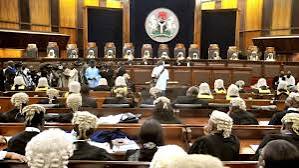The Supreme Court has dismissed the suit filed by the Attorneys-General of some states against the Act establishing and giving prosecutorial powers to the Economic and Financial Crimes Commission (EFCC).
The seven member panel of the apex court led by Justice Uwani Abba-Aji upheld the existence and the powers of the anti-graft agency to prosecute financial crime offenders.
The states had argued in the suit brought against the Attorney-General of the Federation that a United Nations Convention Against Corruption was incorporated into the EFCC Establishment Act, contrary to Section 12 of the 1999 Constitution (as amended).
They argued that the constitutional provision required a majority of the states’ Houses of Assembly to agree with the National Assembly to pass the EFCC Act.
But Justice Abba-Aji in her judgement, held: “By Section 15 of the 1999 Constitution, and the decision of this apex court in AG vs Ondo, the National Assembly has the powers to enact laws relating to fighting corruption, irrespective of whether the funds belong to the federal, state, or local governments,” she said, adding that the states are constituents of the federal government.”
She said, “Indeed, the effect of the provisions of the EFCC Act leaves no doubt that it has the power to investigate and prosecute financial crimes.”
She also held , “No state has the right to enact a law that is inconsistent with the laws enacted by the National Assembly.”
The Supreme Court also dismissed similar suits brought to contest the existence and powers of the Nigerian Financial Intelligence Unit (NFIU) and the Independent Corrupt Practices Commission (ICPC).
